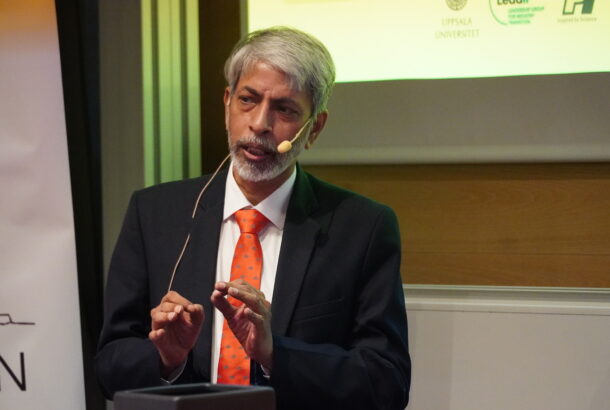Major steel manufacturer SAIL (Steel Authority of India Limited) joins LeadIT.
SAIL is one of the oldest established steel manufacturers in India with nearly seven decades of history as a major steel producer. Its roots can be traced back to the 1950s as one of the primary businesses that propelled India on the path to self-sufficiency in steel. It is a leading Maharatnas of the country’s Central Public Sector Enterprises under the ownership of the Indian Ministry of Steel. As one of the largest steel producers, SAIL faces significant challenges posed by the inherently carbon intensive nature of steel production and, like the vast majority of the Indian steel industry, a historical reliance on coal.
SAIL Chairman, Amarendu Prakash speaking at Almedalen about joining LeadIT
About SAIL
- SAIL can trace its origins back to the formative years of India as a nation when the steel sector was established to propel economic growth. It started out as Hindustan Steel Limited which was set up in 1954.
- The Steel Authority of India Ltd. under ownership of the Ministry of Steel was incorporated in 1973.
- SAIL produces iron and steel at five integrated plants and three special steel plants, located principally in the eastern and central regions of India.
- SAIL also operates a raw materials division with a network of mines providing iron ore for its steel production

The Dhola-Sadiya bridge, India's longest built with steel from SAIL
Read our interview with the SAIL Chairman, Amarendu Prakash as he outlines his vision for the future of steelmaking and how membership of LeadIT can support SAIL in its decarbonization goals.

Why did SAIL want to join LeadIT?
There are several compelling reasons for SAIL to join LeadIT, as it brings together conscientious organizations committed to action for net-zero transition. LeadIT offers a platform for partnerships, fostering cooperation between countries and leading companies. LeadIT encourages sectoral and cross-sectoral learning, sharing insights on new technologies and innovative opportunities. It provides access to a network of like-minded entities, enabling knowledge exchange and support in transition strategies. By joining LeadIT, SAIL intends to demonstrate its strong commitment to climate action and align itself with global efforts to mitigate climate change.
What will SAIL bring to LeadIT?
SAIL is one of the largest steelmaking companies in India and one of the leading Maharatnas of the country’s Central Public Sector Enterprises. The company has operational experience of more than six decades and its crude steel production has grown from 0.158 million tonne in 1959-60 to 19.2 million tonne during 2023-24.
SAIL has already reduced its CO2 emission intensity by ~20% since 2005-06 and actions are in place to further decarbonize in-line with the Government of India’s Nationally Determined Contributions.
SAIL has a wide range of captive raw material resources offering a playing field for researchers for quality optimization. SAIL would like to collaborate with the best in the industry for gainful utilization of these resources.
SAIL has a well-developed R&D Centre for Iron & Steel (RDCIS) situated at Ranchi that has been providing innovative solutions not only for producing quality steels of different grades but also for reducing emissions from our facilities. Our facilities and expertise can be useful to drive innovation in the Indian context for developing curated breakthrough technologies through collaborative efforts.
SAIL has partnered with many organizations in the areas of breakthrough technology development such as injection of alternate fuel in BFs and CCUS. This shows a collaborative spirit that can benefit the LeadIT community
By joining LeadIT, SAIL would bring a wealth of experience and commitment to sustainable practices in the steel industry. SAIL is confident of contributing to the global efforts to develop and establish innovative technology to drive effective changes in the steel industry along with transition to green technology. SAIL is committed to join hands to lead the global decarbonisation efforts.
What is SAIL's vision for the steel industry of the future?
Steel is one of the hard-to-abate sectors and is highly dependent on conventional non-renewable sources to meet its energy demand. However, the industry has shown its flexibility to adopt measures to reduce its energy needs by innovation, upgrading infrastructure, getting rid of energy intensive processes, and enhancing circularity. The technology landscape of global steel industry has changed drastically in the last half century with emergence of newer steel players and changes will continue to occur.
At SAIL, we feel that the steel industry needs to be more responsible to be relevant. A number of R&D efforts are already underway across the world to steer the steel industry away from the energy demanding conventional steelmaking processes to much cleaner and sustainable alternate steelmaking processes such as hydrogen-based metallurgy, green electricity-based steelmaking, usage of biofuels, direct reduction of ore using green electricity, among others. However, these efforts need to be expedited.
It is critical for the steel industry to collaborate, rapidly innovate to provide sustainable solutions, develop centres of excellence, exchange knowledge, build the capability to meet the rapid changes, create consensus amongst stakeholders about ever-rising global climate concerns, among others to ensure sustainable growth of the industry.
As an environmentally conscious organization, SAIL envisions a steel industry that is able to meet the demand for steel without compromising on sustainable production ways.
Where does SAIL see its role in that future?
SAIL being a PSU of the Government of India, is poised to grow in line with our country’s growing developmental needs to become a major manufacturing hub; however, SAIL understands its responsibilities towards reducing emissions and leading the Indian steel industry to a sustainable future.
SAIL is presently at the cusp of significant investments on a large-scale growth plan aligned to India’s National Steel Policy goal by the year 2030-31. This will mandate investing in technologies that not only drive energy efficiencies as well as resource efficiencies but also ensure low carbon emissions.
SAIL’s role is centered around being a catalyst for growth, innovation, and sustainability within the Indian steel industry to lead it to a sustainable future. SAIL has planned its net zero journey in-line with the Government of India’s net zero goal; however, going forward, SAIL would align with LeadIT’s vision, and would look to actively collaborate and partner with other LeadIT members to accelerate its transition for achieving this common goal of net-zero by 2050.
